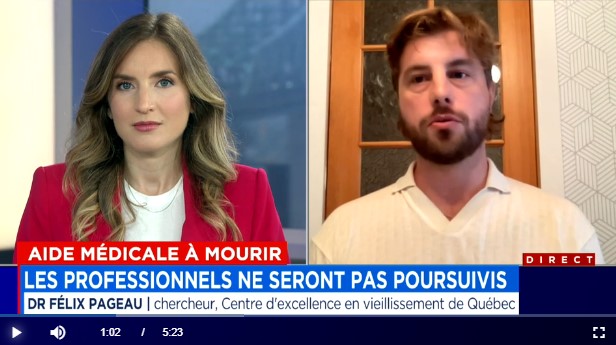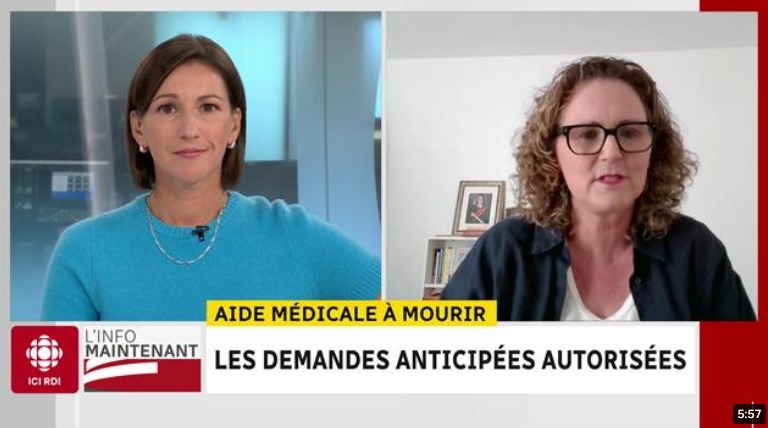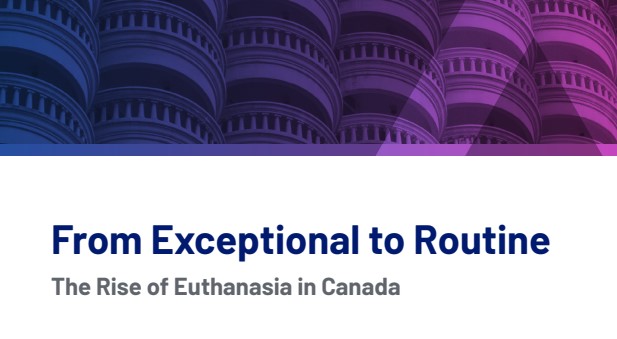Bonjour,
We are delighted to welcome you to another season of newsletters from the Living with Dignity citizen network.
Our press release, which was sent out last Monday in response to the announcement of the implementation of advance requests for medical assistance in dying as of October 30 in Quebec did not generate any media coverage, apart from a mention on the Gènéthique information site (in French). However, we have confirmation that it was read by many journalists. We also received a lot of positive feedback from our allies after its publication, and we will be preparing further actions in the coming weeks.
On September 11, the Ministry of Health and Social Services updated its website (in French) to provide details of the measure for advance MAiD applications. We are still waiting with interest for the protocols that will be in force for assessing people diagnosed with a cognitive disorder and for administering MAiD to people incapable of giving consent…
On September 19, we will also be listening to the documentary series La Mort libre (Free Death), prepared by Radio-Canada journalists Alain Gravel and Alexandre Sheldon. You can count on us to respond quickly to the content that will be available on the Ohdio platform (app and website).
Thank you for your support,
Jasmin Lemieux-Lefebvre
Coordinator
Living with Dignity
Advance requests for MAiD: voices to be heard
Since
the announcement of the implementation of advance requests for MAiD in Quebec
on October 30, there have been many expressions of support and relief, with
many people delighted that it will soon be available. There were also many
questions about the legal protection of the professionals that will be involved
in administering MAiD.
We
would like to highlight two voices that stood out from the crowd in their
constructive exposition of the problems associated with the application of such
a measure.
Dr Félix Pageau
Mme Nicole Poirier
As
a complement, we’d like to recommend an interesting podcast: Dr Pageau’s second appearance on La santé: au-delà des maux, hosted by Dr Jean-Pierre Gagné. If you don’t
have enough time to listen to the full hour (in French), the issue of dying
with dignity is addressed at 22:17 and the one on advance requests for MAiD, at
29:57.
Suffering children at the end of life: the duty to improve access to paediatric palliative care
You
may have heard the cry from the heart of Valérie Daigle, mother of Grégory, who
died in Quebec this summer at the age of 11. She denounced the conditions under
which he died.
Grégory
lived with cerebral palsy and hydrocephalus. He was a happy boy living with a
loving family. During an operation last June, he contracted a bacterium and his
condition rapidly deteriorated. Two weeks later, he had to receive comfort
care.
Here
is the story of the end of his life, as reported by Radio-Canada (in French, our translation).
“For
seven weeks, his loved ones stayed at Grégory’s bedside as he went through a
long period of agony. (…) She (his mother) would have hoped for an earlier,
gentle departure. Holding his hand, surrounded by his loved ones, while a
doctor administered the injection that would quickly put him out of his misery.
The Canadian law on medical assistance in dying does not allow this. She wants
an amendment with extremely clear guidelines. ‘I don’t want a child to die
because he’s disabled. My little fellow has had an extraordinary life over the
last 11 years, despite his differences and his limitations. However, there
comes a time when the limit is reached and these children no longer have any
quality of life and suffer a great deal. That’s when we have to consider the
option.”
In
response to Grégory’s end of life, the right thing to do is not to open the
door to substituted consents allowing MAiD for children and/or people incapable
of giving consent. We are convinced that better access to quality paediatric
palliative care must be promoted throughout Quebec.
Faced
with these difficult ethical debates, we sincerely acknowledge Ms Daigle’s
suffering and would like to offer our condolences to all of Grégory’s family
and friends.
On August 7, Cardus published a research report on the rise of euthanasia in Canada. Alexander Raikin’s remarkable work deserves your attention.
www.cardus.ca/research/health/reports/from-exceptional-to-routine
SEP
2024



